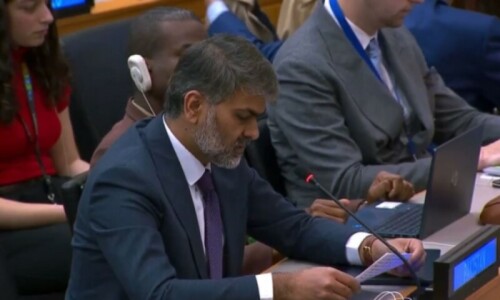WASHINGTON: The Financial Action Task Force (FATF) is unlikely to blacklist Pakistan during its annual meetings in Paris but may keep it on its watch list, says a US scholar of South Asian studies.
The meetings began on Monday but the plenary session, which will decide whether to keep Pakistan on its watch list, also known as the grey list, begins on Feb 19.
“It’s too early for Pakistan to be removed from the grey list — that will be decided at a meeting later in the year,” says Michael Kugelman, a scholar of South Asian affairs at the Woodrow Wilson Center, Washington.
“What is clear to me is that Pakistan will not be blacklisted.”
But Uzair Younus, a non-resident fellow at the Atlantic Council, Washington, says “indications are that Pakistan will probably be off the grey list in the coming months, if not weeks”. This, he argues, “will allow financial capital flows to grow further, which is good for the economy, at least in the short term”, said the scholar at a recent seminar on Pakistan at the US Institute of Peace, Washington.
FATF’s plenary session, which will decide whether to keep Pakistan on grey list, begins on Feb 19
“US officials believe Pakistan has made enough progress with its FATF action plan, and the conviction of Hafiz Saeed on terror financing charges will be an encouraging sign for FATF members too,” says Mr Kugelman.
“The question of the grey list is more complicated. Washington is still looking for wholesale and irreversible steps, and the revelation that Masood Azhar is ‘missing’ won’t go down well. This suggests that unless things change in the coming weeks, Pakistan may have trouble convincing FATF to be removed from the grey list.”
Madiha Afzal of Brookings Institution, Washington, says in a tweet that militant leader Hafiz Saeed’s conviction is “significant” but it’s important to see how his appeal is dealt with.
She raises the question being asked by some in Washington: Will Hafiz Saeed’s “conviction eventually be overturned, especially if Pakistan comes off the FATF grey list?”
Some are also raising the concern expressed when Pakistan was first put on the grey list in 2018, the “listing can push Pakistan further into China’s orbit.”
Pakistan was previously placed on the grey list in 2012-2015 but was removed in 2016 after legislating drastic reforms to its anti-money laundering and counter-terrorist financing regulations. Pakistani officials pleading the country’s case in Paris believe that if they convince a few Western nations that the actions they have taken since the last FATF meeting in October 2019 would eradicate terrorist financing, Islamabad could be out of the grey list.
Recently, China, which now chairs the FATF, issued a list of priorities for its presidency, which includes “closely monitoring and reporting on the financing of ISIL, AQ and Affiliates”.
It also highlights the need to “work on confiscation and asset recovery; best practices to improve the transparency of beneficial ownership”.
The priorities also talk about “mutual evaluations of Russia, Turkey, United Arab Emirates, Korea, Japan and South Africa; and the first 5th year follow-up assessments of effectiveness for Norway, Spain, Australia, Belgium and Malaysia”.
But it does not mention Pakistan. In a statement issued after FATF’s October 2019 meeting in Beijing, China warned against targeting Pakistan to please others (India) and hailed Islamabad’s effort to fight terrorist financing and money laundering.
Another key FATF member, Turkey, also strongly supports Pakistan. On Saturday, Turkish President Recep Tayyip Erdogan had told Pakistan’s parliament: “We will be supporting Pakistan at the Financial Action Task Force meetings, where Pakistan is subject to political pressure.”
Malaysia also supports Pakistan’s efforts to get off the grey list. And the support of these three countries is enough to block India’s moves to blacklist Pakistan.
But to get off the watch list, it needs support from other nations, particularly the United States. Last week, a senior US official, Assistant Secretary Alice Wells, appreciated Hafiz Saeed’s conviction. Her statement was interpreted as indicating that Washington does not want to blacklist Islamabad, but it may want Pakistan to do more before supporting its efforts to come off the grey list.
Published in Dawn, February 18th, 2020













































